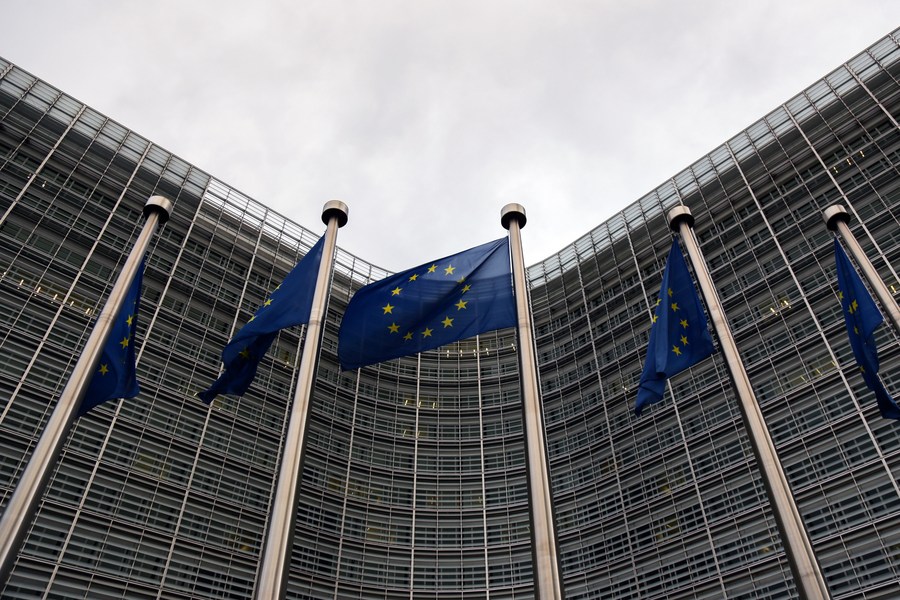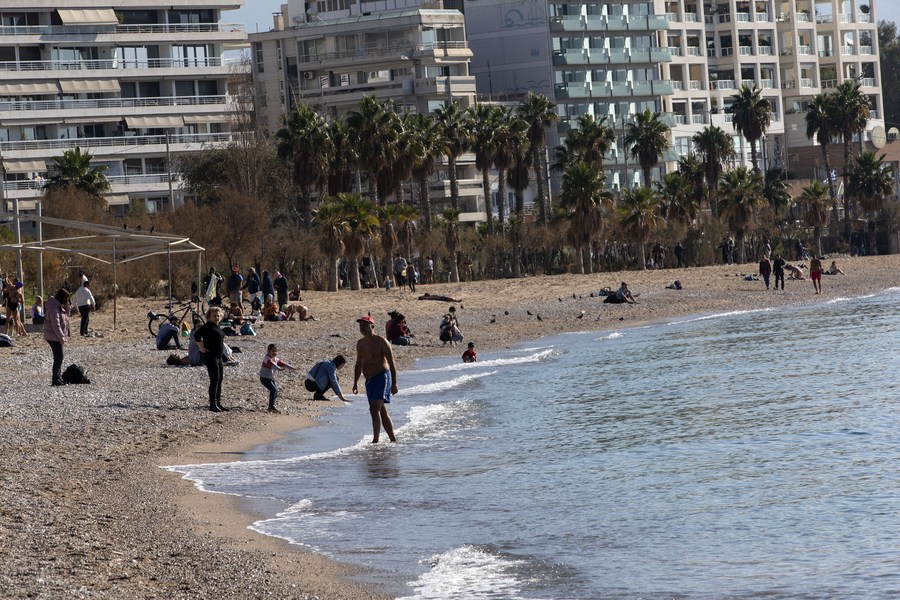EU staves off economic contraction but not yet off hook

EU flags are seen outside the European Commission in Brussels, Belgium, Jan. 6, 2023. (Xinhua/Zheng Huansong)
Though the worst fears for the European economy did not materialize in 2022, market observers believe the outlook in Europe is still overshadowed by spiraling inflation and contracting demand.
BRUSSELS, Jan. 31 (Xinhua) -- Economic output in the eurozone increased infinitesimally and the European Union's (EU) GDP narrowly escaped recession in the fourth quarter, official data showed Tuesday, but uncertainties remain.
Though the worst fears for the European economy did not materialize in 2022, market observers believe the outlook in Europe is still overshadowed by spiraling inflation and contracting demand.
NARROW ESCAPE
The eurozone's GDP saw a meager increase of 0.1 percent in the last quarter of 2022 over the previous quarter, Eurostat, the statistical office of the EU, said Tuesday.
"The eurozone economy once again defied recession in the fourth quarter, showing incredible resilience," Bert Colijn, a senior economist at ING, a Dutch multinational banking and financial services corporation, said in a note, adding that it was a "narrow escape."
Measured on an annual basis, the economic data for the EU and the eurozone painted a rosier picture.
Compared with the same quarter in 2021, the eurozone's GDP in the fourth quarter grew by 1.9 percent and that of the EU increased by 1.8 percent.

Pedestrians walk on a business street in Brussels, Belgium, Jan. 3, 2023. (Xinhua/Zheng Huansong)
The eurozone economy grew for four consecutive quarters last year with GDP going up by 0.6 percent, 0.8 percent, 0.3 percent and 0.1 percent, respectively.
Annual GDP growth was 3.5 percent in the eurozone and 3.6 percent in the EU.
WARM WINTER
The warm winter in Europe has played a crucial role in bringing down the demand for natural gas. As European countries refilled their natural gas storages with imported liquefied natural gas (LNG), natural gas prices decreased substantially.

People spend time at a beach in Faliro, a southern suburb of Athens, Greece, on Jan. 6, 2023. (Xinhua/Marios Lolos)
Economists used to worry that a natural gas shortage could lead to rationing and suspension of production in European factories.
In addition, the post-pandemic strong consumption in Europe turned out to last longer than expected. The support measures taken by European countries to shore up their economies have also contributed to the prevention of a contraction in Europe in the last quarter of 2022.
RISKS REMAIN
However, European economies are not out of the woods yet, and growth in Europe has "slowed to the point of stagnation," said Colijn, the ING senior economist.

Pedestrians walk on a business street in Brussels, Belgium, Jan. 3, 2023. (Xinhua/Zheng Huansong)
As high inflation is eating into consumers' purchasing power, domestic demand in European countries is likely to decline.
Besides reports of contracting domestic demand in Germany, France and Spain, doubts about the sustainability of robust exports and investment pressures will probably plunge the European economy into contraction in early 2023.
Thiess Petersen, a senior advisor at German think-tank the Bertelsmann Stiftung, believes that energy supply will still haunt the European economy in 2023.
"Securing energy supply is, therefore, a top priority for 2023," he said in a report published in December.
Photos
Related Stories
Copyright © 2023 People's Daily Online. All Rights Reserved.









